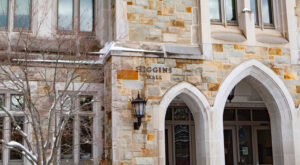The National Science Foundation (NSF) awarded Boston College Felter Family associate professor of economics Theodore Papageorgiou a $700,000 grant to continue his research on investments in the infrastructure of U.S. ports.
“Now we want to think about ports and port infrastructure investment,” Papageorgiou said. “So for instance, there was some money for port infrastructure investment in the Biden infrastructure bill. … Imagine you’re the federal government, where should you spend that money?”
Papageorgiou is conducting his research in collaboration with Myrto Kalouptsidi, an associate economics professor at Harvard University, and Giulia Brancaccio, an assistant economics professor at New York University.
Papageorgiou said one key aspect of his research is supply chain shocks—unforeseen events that interrupt the global supply chain. He analyzes the likelihood of these shocks occurring at specific ports to determine whether the government should ultimately invest in infrastructure there.
“If these shocks happen very often, maybe it makes a lot of sense to invest a lot of money in infrastructure,” Papageorgiou said. If these shocks are very rare, this is a once in a lifetime event, it’s not obvious it’s worth [spending] a lot of money on infrastructure.”
Christopher F. Baum, chair of the BC economics department, noted how impressive Papageorgiou and his co-researchers’ award is given the competitiveness of NSF economics grants.
“It is very impressive to have one of our colleagues receive a sizable award from the National Science Foundation because funding for economics research projects from the NSF is very competitive,” Baum said.
The grant comes from a new NSF program, Strengthening American Infrastructure, that promotes research aimed at strengthening American infrastructure, according to Baum.
According to Papageorgiou, port infrastructure is important because it acts as a support system. Without proper infrastructure, the likelihood of supply chain disruptions increases because there will be fewer ports available.
“Essentially, infrastructure acts as insurance against [supply chain shocks],” Papageorgiou said. “The more infrastructure you have, the more capacity ports have, the less likely it will be for us to see supply chain disruptions in the future.”
According to Kalouptsidi, the COVID-19 pandemic showcased the impact of the economists’ research and just how little is known about transport infrastructure.
“[The pandemic] was a very nice illustration for how disruptive transportation markets and transport infrastructure can be,” Kalouptsidi said. “But I think we actually know very little about this, and so the more we can find out the better.”
Kalouptsidi explained that much of the funding from the NSF grant will go toward hiring students to aid in their ongoing research.
“A lot of this will go to students—graduate and undergraduate—to help us out with the research, and some of it will go for the acquisition of additional datasets because [the research] is very data heavy,” Kalouptsidi said.
The team’s research also looks at congestion in shipping ports across the country and the impact of ports on the entire global economic system, according to Papageorgiou.
“If you invest in one port, that’s going to affect how much congestion there’s going to be in other ports as well,” Papageorgiou said. “So one of the points we’re thinking about making, or we’re trying to make, is that these decisions need to be coordinated.”
Papageorgiou stressed the necessity of studying port infrastructure beyond the local level to fully capture its overall effect on economies.
“You shouldn’t be just making a lot of these decisions at the local level, thinking about only one port … the impact only on that one port or the local economy there,” Papageorgiou said. “You also want to think about the impact and the spillovers this will have on other ports.”
According to Baum, Papageorgiou’s research highlights the wide scope of economics, and he stressed there is more to the field than just focusing on money.
“[The research] is indicative of, you know, what you could do with economics,” Baum said. “It’s not all about money. It’s about how our economic systems work, how they interface with everything else, with technology and engineering systems, things of that nature and to what degree those systems can then be optimized.”
Update (11/19/23, 9:33pm): This article was updated to include Papageorgiou’s full title.




